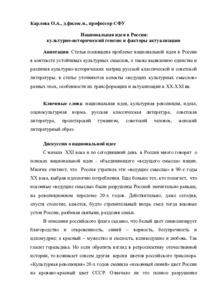Показать сокращенную информацию
National Idea in Russia: Cultural and Historical Genesis and Factors of Actualization
| Автор | Карлова, Ольга Анатольевна | |
| Дата внесения | 2020-01-20T07:56:04Z | |
| Дата, когда ресурс стал доступен | 2020-01-20T07:56:04Z | |
| Дата публикации | 2019-06 | |
| Библиографическое описание | Карлова, Ольга Анатольевна. National Idea in Russia: Cultural and Historical Genesis and Factors of Actualization [Текст] / Ольга Анатольевна Карлова // Журнал Сибирского федерального университета=Journal of Siberian Federal University - Humanities and Social Sciences: Гуманитарные науки. — 2019. — Т. 12 (№ 6). — С. 996-1016 | |
| URI (для ссылок/цитирований) | http://elib.sfu-kras.ru/bitstream/handle/2311/110431/Karlova.pdf;jsessionid=12C2117CA48A4F1FBB284622741C6A7A?sequence=1 | |
| URI (для ссылок/цитирований) | https://elib.sfu-kras.ru/handle/2311/129205 | |
| Аннотация | The article is devoted to the problem of national idea in Russia in the context of sustainable cultural meanings. The subject of this research is determined by actualization in the modern Russian public consciousness of various, sometimes contradictory, ideological concepts originating both in pre-revolutionary times and in the Soviet period. The article questions the well-known thesis that proletarian Cultural Revolution meant complete destruction of Russian traditional culture. The purpose of the current research, thus, is to clarify philosophical-cultural nature of fundamental national ideas of various eras in the Russian history. Through the example of literary process of 19th — 20th centuries Russia by the method of comparative philosophical-literary and cultural analysis using semiotic and phenomenological approaches, the article reveals the unity and difference of contexts of the Russian national idea of different eras; the aspects of its major cultural meanings, features of their transformation and actualization in the 20th and 21st centuries are specified. The hypothesis has been confirmed that in various epochs of Russian culture the presence of its stable elements — deeply rooted national-semantic “matrix” — is traced. Its connection with thoughts expressed by the philosophers, writers and politicians of different eras is stated. As a result, it is argued that this connection has led to the fact that such thoughts acquire the status of national ideas. The conclusion that the connection with main semantic centers of national culture — affirming or denying — actualizes the ideas of previous eras in the historical perspective of the national identity development, can be used in scientific research on this issue, in corresponding courses in history, political science and cultural studies, as well as in the practice of modern social process in Russia | |
| Тема | national idea | |
| Тема | Cultural Revolution | |
| Тема | ideal | |
| Тема | socio-cultural norm | |
| Тема | Russian classical literature | |
| Тема | Soviet literature | |
| Тема | proletarian humanism | |
| Тема | Soviet person | |
| Тема | literary female image | |
| Название | National Idea in Russia: Cultural and Historical Genesis and Factors of Actualization | |
| Тип | Journal Article | |
| Тип | Journal Article Preprint | |
| Страницы | 996-1016 | |
| ГРНТИ | 13.11.21 | |
| Дата обновления | 2020-01-20T07:56:04Z | |
| Институт | Гуманитарный институт | |
| Подразделение | Кафедра рекламы и социально-культурной деятельности | |
| Журнал | Журнал Сибирского федерального университета=Journal of Siberian Federal University - Humanities and Social Sciences | |
| Квартиль журнала в Scopus | без квартиля |

